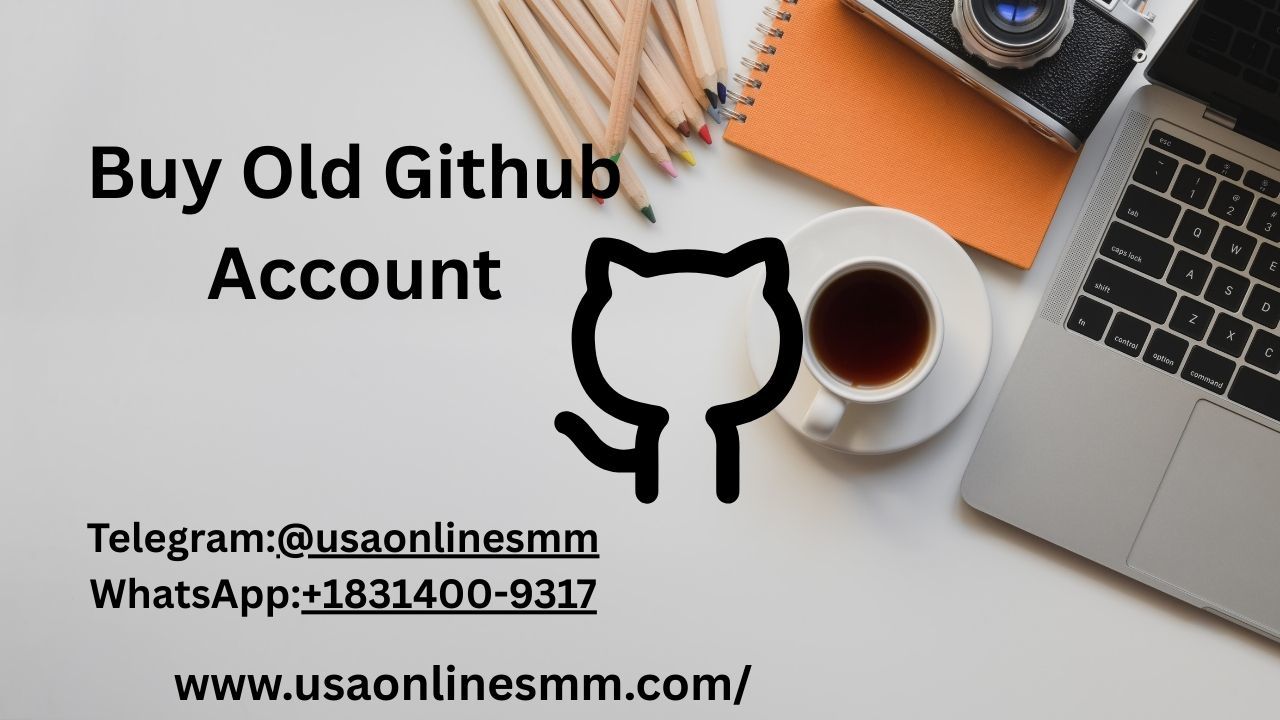Buy Old Github Account
In the evolving world of software development, GitHub has become an indispensable platform for coders, developers, and tech enthusiasts. Over the years, GitHub has not only provided a space for collaborative coding but also established itself as a hub for professional credibility and project visibility. The idea of buying old GitHub accounts has gained traction in recent years, and this guide explores why such accounts are sought after, their benefits, legal considerations, and practical tips for acquiring and managing them effectively.
If you want to more information just knock us 24-hour reply
Telegram:@usaonlinesmm
WhatsApp:+1831400-9317
Understanding Old GitHub Accounts
Old GitHub accounts are accounts that have been active for a significant period, often containing repositories, stars, forks, and an established network. These accounts carry a sense of history and credibility because they are not newly created and often have contributed to open-source projects over time. Unlike new accounts, old accounts are* perceived as authentic* and trustworthy, which can significantly benefit developers or businesses looking to establish a stronger presence on GitHub.
The concept of an old GitHub account is not limited to its age. The activity and engagement associated with it, such as the number of contributions, starred projects, and followers, also define its value. Buying an old account can provide a head start for someone who wants to showcase a portfolio or gain recognition without waiting years to build a reputation from scratch.
Benefits of Buying an Old GitHub Account
Acquiring an old GitHub account comes with multiple advantages for developers and organizations. One of the most notable benefits is instant credibility. When potential employers, collaborators, or clients visit your GitHub profile, they can see a history of consistent activity and contributions to significant projects. This can immediately enhance trust and authority in your niche.
Another benefit is the visibility that comes with an established network. Old GitHub accounts often have followers who are active in the tech community. By buying such an account, you inherit a portion of this network, which can increase the reach of your repositories and projects. This can be particularly useful for developers launching new open-source tools or businesses promoting tech products.
Moreover, old accounts often come with repositories that already have stars, forks, and engagement metrics. This historical data can be leveraged to gain traction for new projects or demonstrate coding proficiency, which can be appealing for personal branding and professional growth.
How to Identify a Genuine Old GitHub Account
Finding a reliable old GitHub account requires careful consideration. The first step is to evaluate the account's history. Look at the creation date, the frequency of contributions, and the type of projects the account has been involved in. A genuine old account will have a consistent pattern of activity over the years, including contributions to various repositories, collaborative projects, and meaningful commits.
Next, assess the engagement metrics. The number of stars, forks, and followers can provide insights into the account's reputation within the community. However, high numbers alone are not sufficient; it is essential to ensure that these metrics are authentic and not artificially inflated. Checking the quality and relevance of repositories can help determine the legitimacy of the account.
Additionally, review the account's profile for any red flags, such as incomplete information, missing commit history, or suspicious activity. A trustworthy old GitHub account should have a clear profile, active participation in discussions, and contributions that reflect genuine coding experience.
Legal and Ethical Considerations
While buying old GitHub accounts can be beneficial, it is crucial to consider the legal and ethical aspects. GitHub’s terms of service prohibit the sale of accounts, meaning that purchasing an account directly may violate platform rules. It is essential to approach this practice with caution to avoid potential penalties or account suspension.
Ethically, the transaction should involve transparency and respect for the original account owner. Ensure that the transfer of the account is agreed upon by both parties and that any previous intellectual property or content rights are respected. Misuse of someone else’s account, such as claiming their contributions as your own, can lead to reputational damage and legal issues.
A safer alternative is to collaborate with the original owner to transfer project*s, repositories, or contributions rather than the account itself. This approach allows you to benefit from an established presence while remaining compliant with GitHub’s policies.
Evaluating the Value of an Old GitHub Account
The value of an old GitHub account is not determined solely by its age. Several factors contribute to its worth, including activity history, repository quality, followers, and engagement metrics. A well-maintained account with high-quality contributions and a strong network can command a higher value than a dormant account with minimal activity.
It is also essential to consider the relevance of the repositories. Accounts with contributions to trending or widely-used technologies are often more valuable, as they demonstrate expertise in areas that are in demand. Additionally, accounts with a history of collaborative projects can indicate strong teamwork skills, which can be appealing for professional opportunities.
When evaluating an account, consider the potential return on investment. An account that can boost your professional credibility, provide access to a network, or enhance the visibility of your projects can offer long-term benefits that justify the purchase.
Risks Associated with Buying Old GitHub Accounts
Despite the advantages, there are risks involved in buying old GitHub accounts. One major risk is the potential for account suspension. If GitHub detects that the account has been sold or transferred improperly, it may suspend the account, resulting in a loss of investment and reputation.
Another risk is the quality of the inherited network. While an old account may have followers, there is no guarantee that these followers are active or relevant to your niche. It is essential to evaluate the engagement levels and relevance of the network before proceeding with a purchase.
Additionally, there may be security concerns. An account that has been compromised or previously misused can pose significant risks, including exposure to sensitive information or malware. Ensuring the account’s security history and implementing robust protection measures is crucial for a smooth transition.*
How to Safely Buy an Old GitHub Account
Safety is paramount when acquiring an old GitHub account. Start by researching reputable platforms or individuals that facilitate the transfer of accounts while maintaining transparency and trust. Verify the authenticity of the account, the history of contributions, and the credibility of the seller.
It is advisable to conduct the transaction in a way that minimizes risk, such as using secure payment methods or escrow services. Ensure that both parties agree on the terms of the transfer, including access, responsibilities, and intellectual property rights.
After acquiring the account, update the security settings immediately. Change passwords, enable two-factor authentication, and review connected applications to ensure full control over the account. Regular monitoring and maintenance of the account are essential to prevent unauthorized access and maintain credibility.
Alternatives to Buying Old GitHub Accounts
For those who are cautious about purchasing old accounts, there are alternative strategies to achieve similar benefits. One approach is to focus on building a strong GitHub profile organically. By contributing to popular open-source projects, collaborating with other developers, and consistently sharing high-quality repositories, you can establish credibility over time.
Another alternative is to participate in GitHub communities, forums, and discussion boards. Engaging with the developer community can increase visibility and attract followers naturally. Additionally, collaborating with experienced developers on joint projects can enhance your profile without the need to buy an account.
Creating a personal brand around your GitHub profile is also effective. Sharing tutorials, coding challenges, and insights on social media platforms can drive traffic to your repositories, increase engagement, and build a network organically. This approach may take longer, but it aligns with ethical practices and ensures long-term growth.
Maximizing the Potential of an Old GitHub Account
Once you acquire an old GitHub account, it is important to leverage its potential effectively. Start by assessing the existing repositories and identifying opportunities for improvement or expansion. Update outdated projects, fix issues, and enhance documentation to increase visibility and engagement.
Engage with the account’s network by responding to comments, collaborating on forks, and participating in discussions. Building relationships with followers and contributors can amplify your presence and establish you as a trusted developer in the community.
Consistency is key. Regular contributions, updates, and interactions will maintain the account’s credibility and prevent it from appearing dormant. Use analytics tools to monitor repository performance, track engagement metrics, and identify trends that can inform your strategy.
Conclusion
Buying an old GitHub account can offer numerous benefits, including instant credibility, network access, and visibility for projects. However, it comes with legal, ethical, and security considerations that must be addressed to avoid potential pitfalls. By carefully evaluating accounts, understanding their value, and implementing safety measures, developers and businesses can make informed decisions that align with their goals.
Whether you choose to buy an account or grow your presence organically, the key lies in consistent contributions, meaningful engagement, and strategic use of the platform. Old GitHub accounts can be a powerful tool when used responsibly, providing a solid foundation for professional growth, project visibility, and community recognition.






Discussion (0)